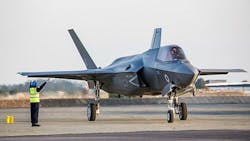Stealthy no more? A German radar vendor says it tracked the F-35 jet in 2018 — from a pony farm
COLOGNE, Germany — In the illustrious history of the F-35 fighter jet, add a pony farm outside Berlin as the place where one company claims the plane’s stealth cover was blown. The story that follows is a snapshot in the cat-and-mouse game between combat aircraft — designed to be undetectable by radar — and sensor makers seeking to undo that advantage. In the case of the F-35, the promise of invisibility to radar is so pronounced that it has colored much of the jet's employment doctrine, lending an air of invincibility to the weapon: The enemy never saw it coming, writes Sebastian Sprenger for C4ISR.com. Continue reading original article
The Intelligent Aerospace take:
October 1, 2019- German radar-maker Hensoldt says it has tracked two F-35s for nearly 100 miles following the 2018 Berlin Air Show. Hensoldt, who said it used its TwInvis radar system to track the jets as they left the air show as Lockheed Martin and the U.S. Air Force did not fly the stealthy aircraft during the show. So, Hensoldt set up shop at a pony farm to see if they could spot the F-35s flying back to the U.S., and claim to have done so.
Lockheed says that when stealth is not required, the F-35 does not employ any additional features so that it can be tracked by air traffic controllers to manage safety
“When the F-35 is not flying operational missions that require stealth — for example, at air shows, ferry flights or training — they ensure air traffic controllers and others are able to track their flight to manage air space safety,” Lockheed spokesman Michael Friedman wrote in a statement to Defense News. “The Air Force can best address questions related to their F-35s participation at the Berlin Air Show.”
Related: BAE Systems to enhance F-35 electronic warfare capabilities
Related: Second work assignment made at U.K. F-35 MRO site
Related: Lockheed Martin selects BAE Systems to sustain F-35 electronic warfare systems
Jamie Whitney, Associate Editor
Intelligent Aerospace
